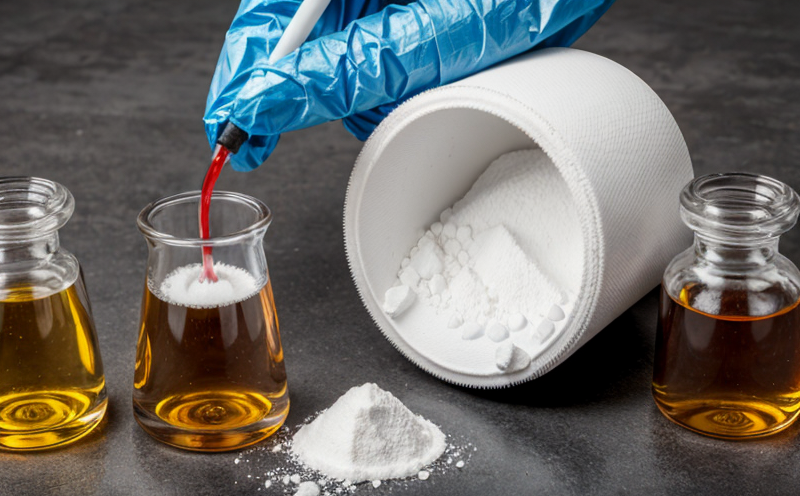UL 746C Chemical Resistance Testing of Polymeric Materials
The UL 746C test is a critical standard for evaluating the chemical resistance of polymeric materials, particularly those used in high-temperature and long-term service applications. This testing is essential to ensure that materials perform reliably under exposure to various chemicals without compromising their integrity or functionality.
UL 746C defines the methods for determining the chemical resistance of thermosetting resins used in electrical and electronic parts, components, and equipment. The test involves exposing specimens made from these polymeric materials to specific chemical solutions over a defined period under controlled conditions. Compliance with this standard is crucial for manufacturers who need to prove that their products meet stringent quality assurance requirements.
The UL 746C test is part of the broader family of UL standards designed to promote safe and reliable electrical products. It is particularly relevant in sectors such as automotive, aerospace, and electronics manufacturing where materials are exposed to a wide range of environmental conditions including chemicals. This testing ensures that components remain stable and functional even when subjected to harsh chemical environments.
The test procedure involves placing specimens into a solution containing the specified chemicals at elevated temperatures for an extended period. After the exposure period, the samples undergo visual inspection, mechanical property evaluation, and other relevant tests to assess any changes in their physical or chemical properties. This comprehensive approach ensures that materials not only resist immediate degradation but also maintain long-term reliability.
The acceptance criteria for UL 746C are stringent. Specimens must pass both short-term (100 hours) and long-term (960 hours) exposure tests without significant loss of performance or structural integrity. Compliance with these standards is a testament to the quality and durability of polymeric materials, providing confidence in their suitability for demanding applications.
Understanding the nuances of UL 746C requires knowledge of both the specific chemical solutions used and the detailed testing procedures outlined in the standard. For instance, common chemicals tested include acetic acid, formic acid, sulfuric acid, nitric acid, hydrofluoric acid, and more. Each solution has its own set of parameters such as concentration levels and temperature ranges that must be strictly adhered to during the test.
Given the complexity of these tests, it is advisable for manufacturers to consult with experienced laboratories like ours. Our expertise ensures accurate specimen preparation, precise control over test conditions, and reliable interpretation of results. By partnering with us, you can ensure that your materials meet UL 746C requirements efficiently and effectively.
Our laboratory adheres strictly to the latest versions of international standards such as ASTM D1692 and ISO 8085 when performing these tests. These additional standards provide supplementary guidance on specimen preparation, test procedures, and data interpretation, enhancing the accuracy and consistency of our results.
The importance of UL 746C cannot be overstated in ensuring product safety and reliability across various industries. By adhering to this standard, manufacturers can build trust with their customers by demonstrating a commitment to quality and compliance. This is particularly important for companies operating internationally, as adherence to global standards enhances market access.
In conclusion, UL 746C chemical resistance testing of polymeric materials is an indispensable process in the development and validation of high-performance components used in demanding applications. By rigorously following this standard, manufacturers can ensure that their products remain reliable and safe under adverse conditions, thereby contributing to overall quality assurance.
Quality and Reliability Assurance
- Compliance with International Standards: We adhere strictly to UL 746C, ASTM D1692, and ISO 8085.
- Accurate Specimen Preparation: Our team ensures that each specimen is prepared according to the specified standards.
- Elevated Temperature Control: We maintain precise temperature conditions during the exposure period.
- Visual Inspection and Mechanical Property Evaluation: After the test, we conduct thorough inspections and mechanical tests to assess any changes in properties.
- Data Interpretation: Our experienced analysts provide detailed reports on the results of each test.
Customer Impact and Satisfaction
The success of UL 746C chemical resistance testing significantly impacts customer satisfaction by ensuring that materials used in high-temperature applications are reliable and safe. For quality managers, this translates to reduced risks associated with product failures due to material degradation. Compliance officers can leverage these test results to meet regulatory requirements confidently.
R&D engineers benefit from the insights gained into how different chemicals affect polymeric materials, enabling them to innovate more robust solutions. Procurement teams gain peace of mind knowing that they are sourcing materials that have been rigorously tested and proven reliable.
Ultimately, customers can trust that products made from these compliant materials will perform consistently over time, enhancing overall product quality and customer satisfaction.
Competitive Advantage and Market Impact
The ability to demonstrate compliance with UL 746C can provide a significant competitive advantage. In today's global market, where quality and reliability are paramount, adherence to this standard sets manufacturers apart from their competitors. It signals to potential customers that the product has been rigorously tested and meets stringent quality benchmarks.
Moreover, meeting these standards opens doors to new markets and opportunities for international expansion. Regulatory bodies often require compliance with global standards like UL 746C to ensure safety and reliability of products sold within their jurisdictions.
In summary, the ability to offer materials that have undergone UL 746C chemical resistance testing positions manufacturers as leaders in product quality and reliability, enhancing both competitive standing and market impact.





